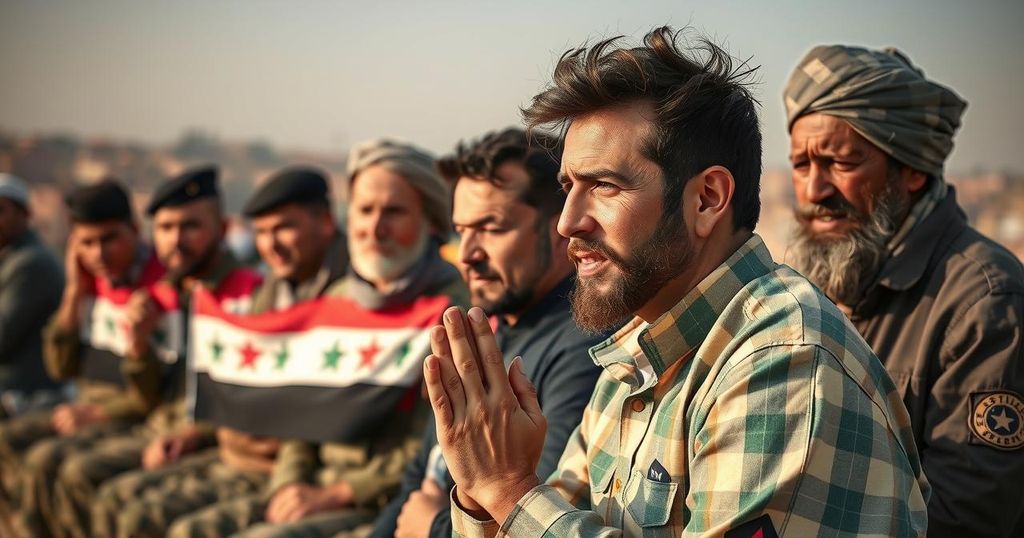Kurds in Syria are anxious about Turkish threats and question whether Israel’s support will extend beyond rhetoric to tangible assistance. With historical precedents of Turkish aggression leading to mass displacement, the SDF, backed by the U.S., manages key territories but is under constant attack from Turkish forces and affiliated militias. As the Kurdish population seeks reassurance, the call for Israeli support has intensified amidst fears for their future amidst ongoing hostilities.
On December 18, Israeli Foreign Minister Gideon Sa’ar engaged in discussions with Jens Plotner, the Foreign Policy and Security Advisor to the Federal Chancellor of Germany, underscoring the international community’s role in protecting minorities in Syria, particularly the Kurdish minority who are currently facing various threats. Many Kurds in Syria express a desire for Israel to extend support beyond verbal assurances, questioning whether Israel will take concrete actions to assist them in their plight.
The Kurds in eastern Syria harbor fears of a potential Turkish assault, especially in cities like Kobani that are pivotal to the Kurdish presence in the region. The precedent of Turkish aggression in 2018, which saw the offensive against Afrin resulting in the displacement of over 150,000 Kurds, looms large in their consciousness. Following the liberation of Aleppo from Assad’s forces, Turkish-backed militias attacked Kurdish displaced populations in Tal Rifaat, forcing another wave of displacement.
The landscape of eastern Syria is primarily governed by the Autonomous Administration of North and East Syria (AANES), whose armed branch, the Syrian Democratic Forces (SDF), was previously supported by the United States in the fight against ISIS. Composed mainly of Kurdish fighters, the SDF successfully defeated ISIS in large parts of Syria by 2019. However, Turkey views the SDF as a direct threat, mistakenly associating it with the Kurdistan Workers Party (PKK), which Turkey designates as a terrorist organization. In its campaign against the SDF, Turkey has employed extremist militias known as the Syrian National Army (SNA), known for severe human rights violations.
Currently, the SDF manages significant territories in eastern Syria, including key towns along the Turkish border. The SDF’s collaboration with U.S. forces provides a level of security, but it is constantly threatened by periodic Turkish airstrikes and ground assaults from the SNA. This compounding pressure prompts questions from the Kurdish population about potential support from Israel and how effective such support could be against the backdrop of Turkish operations and SNA aggressions.
In light of recent geopolitical shifts, the SDF faces an uncertain future concerning its relations with President Assad’s regime, which, unlike the SNA, has shown a degree of restraint towards Kurds. Despite this, Kurdish communities remain under constant threat from diverse aggressors, including ongoing bombardments and artillery strikes aimed at their towns. The SDF’s recent withdrawal from strategic locations like Manbij has raised concerns among local populations about the resurgence of the SNA’s harassment.
Kurds are left pondering the extent of Israel’s commitment towards them. They question, “Will Israel save us?” The call for aerial support for the SDF is echoed in many Kurdish discussions. Reports hint at potential silent cooperation between Israel and the SDF or the U.S.-led coalition. Ultimately, the pressing issue remains whether Israel will translate its supportive rhetoric into significant actions that could bolster Kurdish defenses in eastern Syria against Turkish incursions while ensuring their right to self-determination and safety.
The situation of the Kurdish minority in Syria is dire, especially following historical events where military actions by Turkey have led to significant ethnic cleansing and displacement. The Kurdish population, primarily organized under the Syrian Democratic Forces (SDF), seeks assistance from international powers to safeguard their rights and existence amid threats from Turkish aggression and affiliated militant organizations. The evolving dynamics in Syria have created an environment of uncertainty and fear for the Kurdish communities, necessitating external support to maintain stability and security in the region.
In conclusion, Kurds in Syria face critical threats from Turkish military operations and affiliated groups, placing their existence in jeopardy. While there is hope that Israel might provide more than just verbal support, the Kurdish populace remains uncertain about effective, tangible assistance. The ramifications of continued Turkish aggression necessitate not only solidarity from Israel but also comprehensive strategies to protect the Kurdish community’s rights and autonomy in a region marked by volatility.
Original Source: www.jpost.com






